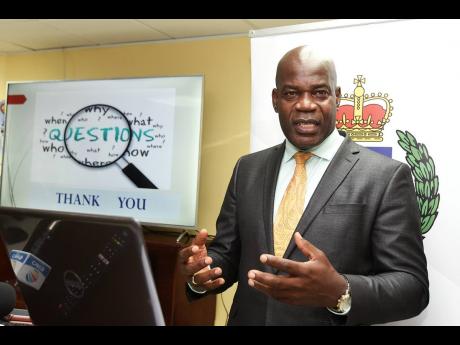Editorial | Juvenile crisis
Juveniles participating in crime is at crisis level. Sounding the alarm bell is someone who has spent decades fighting crime in Jamaica.
Deputy Commissioner of Police Fitz Bailey told a group of school-leavers recently that, over the last six years, persons under age 18 have been responsible for serious crimes, including murder, rape, shooting and assault. This trend, he disclosed, is increasing.
The deputy commissioner had the chilling numbers to reinforce his argument. He said that 1,846 youngsters under age 18 were responsible for more than 10,000 incidents of assaults. More than 3,600 adolescents were killed by their peers. This same age group was blamed for approximately 7,000 firearm offences.
Not many people would have heard the deputy commissioner’s speech delivered at the Maggotty High School in St Elizabeth, but these statistics are serious enough to signal a call to action of all well-thinking Jamaicans.
Mr Bailey argued that there is an urgent need for change, for empowerment, and for a renewed sense of purpose among young people, which he feels will lead to their making conscious choices with positive outcomes.
Six years ago, the problem of youth violence was already a challenge in schools, giving teachers, guidance counsellors and deans of discipline much to worry about. Today, the anti-social and criminal behaviour of at-risk youth is a serious public health issue for which solutions must be found. Over the years, some non-government organisations and community groups have been engaged in outreach work with young people by creating programmes which sought to promote conflict resolution and address violence within the school environment. However, based on the deputy commissioner’s assessment, a full-on assault is now required to successfully reverse the trend of increasing juvenile crimes.
STUDIED INTO EXHAUSTION
The problem of juvenile crime has been studied into exhaustion and, according to the body of research, experts say unstable homes, failure in school, lack of role models and gang influence are some of the main reasons why young adults veer from the straight and narrow path.
Now, it is time for action, for a country cannot expect to meet its development goals if more than 3,000 youth are killed violently and many more find themselves in conflict with the law and locked away. The solution must include early intervention and meaningful engagement, which will place these youngsters into productive activity.
Early intervention is regularly touted as the thing that best reduces the likelihood of youth getting involved in serious crime. In turn, it helps to reduce the burden of crime on society, saving heartbreak that violence creates and saving taxpayers’ dollars to fund incarceration.
The Ministry of Education and Youth should take the active lead to promote the concept of a positive youth development model. There are many examples of successful intervention models which ministry experts can tailor to local needs.
Again, there are many examples of alumni and student associations which have been heavily invested in mentorship in many of the nation’s schools, imparting guidance and often providing financial support for worthy students. Studies have found that students who participate in mentorship programmes are more likely to succeed in their academic and work lives.
The important thing to bear in mind is that even at-risk youth can avoid crime if they experience proper intervention, which includes doing better in school, improving social skills, and associating with better role models.

